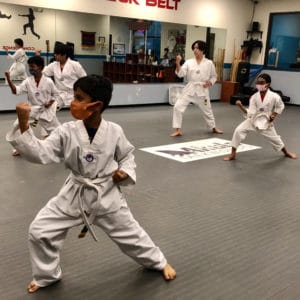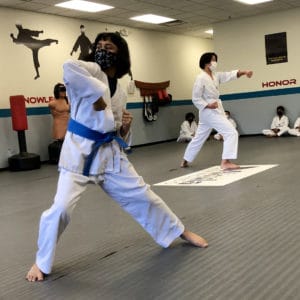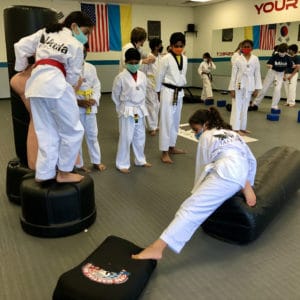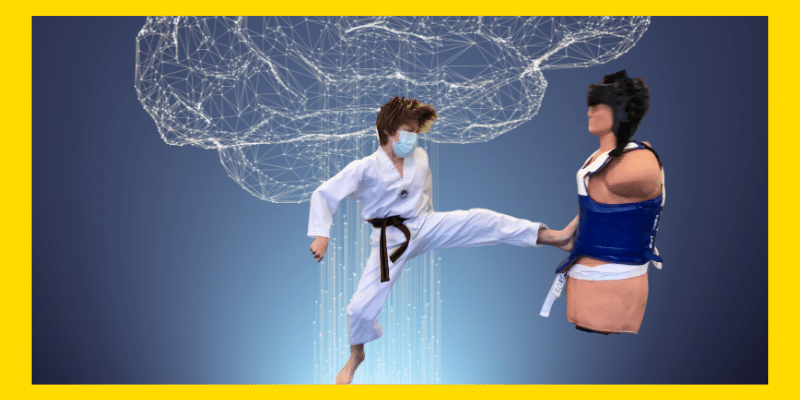Taekwondo for Better Brains for All Ages
Taekwondo is good for the brain. Scientific studies show that martial arts practice can improve cognitive function and neurotrophic factors associated with brain health. Specifically, hard martial arts (karate, Taekwondo, kung fu, and judo) stimulate the development of cognitive function in children and adolescents, and decelerate cognitive decline in middle-aged and older adults.
What are Martial Arts?
Martial arts are offensive and defensive combat systems, characterised by coordinated and cognitively complex movements. The most popular martial arts in the United States are Taekwondo, karate, and jiu jitsu.
How does Taekwondo support brain development in kids?
Taekwondo’s cross-lateral movements work both sides of the body evenly. Students move both hands and feet in coordination with the eyes. As a result, the corpus callosum (the nerve tract that connects the left and right side of the brain), becomes more fully developed.
Coordinated movements activate both hemispheres of the brain. This heightens cognitive function and increases ease of learning. In this way, Martial Arts movements assist whole-brain development. The bilateral and cross-lateral movement prominent in Akula’s martial arts curriculum build pathways between the two hemispheres of the brain.
How does Taekwondo support brain health in adults?
Cognitive performance includes the processes of attention, memory, processing speed, and executive functioning. Cognitive performance typically declines with aging. In a study that compared the acute effects of two types of martial art training to aerobic exercise on cognitive performance in middle-aged adults, only the martial arts improved the highest order of cognitive performance–executive function.
Why is Taekwondo good for the brain?
Scientists have concluded that Taekwondo may improve certain aspects of cognitive function across the lifespan. Further, Taekwondo students often notice that their mental strength grows alongside physical gains as they train. Research shows that coordinated balanced movements stimulate the production of neurotrophins, such as dopamine. These natural substances stimulate the growth of existing nerve cells and increase the number of new nerve cells and neural connections in the brain.
 How Training at Akula Taekwondo Teaches Thinking Outside the Box, a.k.a. Executive Function
How Training at Akula Taekwondo Teaches Thinking Outside the Box, a.k.a. Executive Function
Perseverance and self-control, two of the Five Tenets of Taekwondo, are major components of Executive Function. The perseverance needed to succeed in martial arts leads to sustained attention or problem-solving. The self-control that is cultivated in sparring and partner drills trains impulse control, ability to delay gratification, and automatic response inhibition. A person who develops perseverance and self-control through Taekwondo training has the ability to stick with a task, troubleshoot issues as they arise, and pivot to accommodate changing circumstances.
Physical exercise has a positive effect on memory, focus, decision-making, mood regulation, and working through challenges. Developing (and maintaining!) good exercise habits at a young age improves the odds of success in life. Studies show that regular Taekwondo training may be effective for enhancing cognitive function and academic self-efficacy in growing children.
Learning to think outside the box gives martial arts students the edge in all of life’s competitions because they have a larger toolbox from which to draw. With this advantage, martial artists find it easier to succeed, even in tough times.
 Poomsae for Brain Health
Poomsae for Brain Health
Poomsae, or forms practice, is a major component of Akula Taekwondo’s curriculum. As the student practices poomsae’s coordinated movement patterns, bigger and better nerve networks develop in the brain. Practicing Taekwondo forms (kata in Karate) improves memory. As a result, practicing Taekwondo may help children get better grades in school and help adults stay mentally agile.
Sparring to Boost Problem Solving Skills
Sparring is a controlled form of freestyle fighting within the confines of strict rules and precautions. Success in sparring requires rapidly solving complex problems while performing complex motions. Students learn how to anticipate things before they happen and the importance of thinking a few steps ahead of the competition. Sparring is an incredible mind-body exercise, demanding quick thinking and speedy problem-solving while being pushed to your physical limits.
 Obstacle Course Challenges to Encourage Out-of-the-Box Thinking
Obstacle Course Challenges to Encourage Out-of-the-Box Thinking
To add fun and variety to our classes, Akula instructors occasionally challenge students with an obstacle course. Students must work as a team, think outside the box, and use body and mind together to finish first. Our obstacle courses are a student favorite!
Taekwondo Training Deescalates Stress and Frustration, Improving Mental Health and Cultivating a Positive Outlook on Life
Anger and frustration hinder thinking ability and impulse control, leading to bad decisions and poor outcomes. Practicing Taekwondo or karate gives kids, teens, and adults a productive way to deal with pent up emotions. That’s because intense exercise and concentration shift negative energy, yielding a clear mind capable of making intelligent decisions. Moreover, exercising decreases levels of cortisol, the stress hormone, creating a more peaceful life.
Martial Arts Practice Develops Self-Discipline and Confidence
Life is filled with challenges. Individuals who cultivate self-discipline learn to overcome difficulties through consistent hard work. This improves self-confidence and leads to better decision making. Self-confidence supports success in all areas of life. A confident person is less likely to cave in to peer pressure and more likely to make good choices. Further, individuals who have healthy self-esteem are more likely to take on responsibilities and leadership positions. This creates valuable and rewarding life experiences.
Neuroplasticity
Research on neuroplasticity (the ability of the brain to change) reveals that the brain releases neurotrophic factors when exercising. This leads to the development of new cells in the temporal and prefrontal cortex. The temporal region is responsible for memory, thus helping children learn concepts faster. The prefrontal cortex is involved in executive function, responsible for the capability to push through challenging tasks.
Better Sleep
Rest is essential to cognition. Studies show that mental acuity goes down when a person is sleep deprived. Sleep deprivation can also lead to a variety of health conditions and illnesses. Exercising daily helps with the effective release of melatonin by lowering cortisol levels. Melatonin is responsible for inducing sleep, improving cognitive function through prolonged periods of rest and consistent sleep cycles. As a result, those who train in Taekwondo wake well-rested and refreshed, improving brain function.
 Summary of Brain Benefits of Taekwondo Training
Summary of Brain Benefits of Taekwondo Training
Consistent exercise is crucial for the brain’s growth and nourishment. Taekwondo’s bilateral movements and mind-body exercises offer benefits beyond other physical activities. In short, Taekwondo is good for the brain, good for the body, and an excellent health-building activity.

